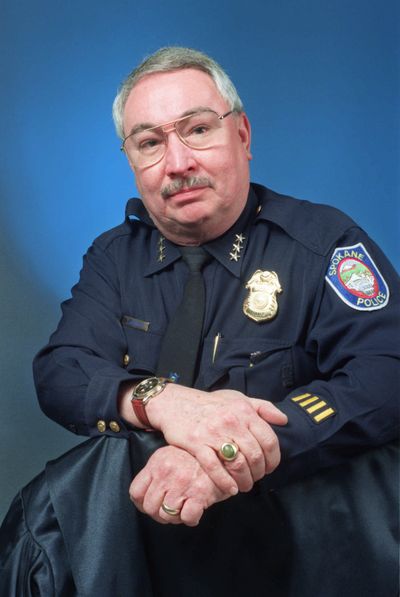Former Police Chief Terry Mangan dies

Former Spokane Police Chief Terry Mangan has died following a long illness.
Mangan, 76, served as chief from 1987 until 1998 and was the first person selected to Spokane’s top cop job from outside the department. He died Monday at a hospital near Washington, D.C.
Former City Manager Terry Novak had recruited Mangan from the Bellingham Police Department after Novak wasn’t satisfied with applications to replace former Chief Robert Panther, a career Spokane officer.
Mangan was known for his introduction of community-oriented policing to Spokane, and the creation of neighborhood COPS offices.
He sought to put Spokane at the forefront of advances in law enforcement, including improved technology and crime analysis. Shortly after arriving in Spokane, he sought funding to bring in a group of minority and women recruits.
“He was a super guy,” said Capt. Dave Richards, a 30-year veteran of the force. He said Mangan had a knack for remembering people’s names and was always friendly.
Richards became a long-running adviser for the law enforcement Explorer Post that was started under Mangan, he said.
Cheryl Steele, former director of community policing for the nonprofit Spokane COPS organization, said Mangan had a well-rounded intellect that combined street smarts and with academic knowledge.
She said Mangan understood that neighborhoods had to be involved in partnering with police and setting standards for public safety.
The murders of two teenage girls in the West Central Neighborhood in 1991 became the catalyst for implementing COPS across the city, and Steele at the time was a West Central advocate for the change.
Mangan also opened dialogue with minority communities, Steele said.
“He was amazingly intelligent,” she said, adding that he spoke nine languages.
Sgt. John Gately said Mangan swore him onto the force in 1990 and proved to be a regional leader in law enforcement.
“He really kind of put a charge into the police department in moving forward,” Gately said. His work brought recognition to SPD, he said.
Mangan’s tenure contained its share of controversy, including incidents of officer misconduct and complaints by some COPS volunteers that the department was exerting too much control. Calls for independent oversight of police remained bottled up at City Hall.
In Bellingham, Mangan was credited with linking Kenneth Bianchi, the “hillside strangler” of Los Angeles, to the deaths of two Western Washington University students, both women, which led to solving the L.A. case. Bianchi pleaded guilty in 1979 to the WWU murders.
Mangan left Spokane for a job as an instructor and consultant at the FBI Academy in Quantico, Va., and continued to work there in his later years.
“I think he loved to teach,” Richards said.
His death came at a Virginia hospital outside of Washington.
In 1964, Mangan joined the Oratorian Fathers order of priests but left in 1967 to become a Seaside, California, patrol officer, according to news files. He participated in civil rights marches at the time.
He was named one of the Outstanding Young Men in America in 1971.
The Washington Association of Sheriffs and Police Chiefs said in a notice to its members that law enforcement in Washington state and around the country “lost a deeply good man, a dear friend, a tremendous leader, a champion.”
Mangan had a literary side.
According to the National Institute Executives Associates, Mangan wrote and produced mystery dinner plays for various charities and produced a classic Greek play as a fundraiser for the Cheney Cowles Museum and Eastern Washington State Historical Society in 1996.
He leaves behind a son and daughter.
Services are expected in Virginia, but have not been scheduled, according to Monique Cotton, spokeswoman for the Spokane police.